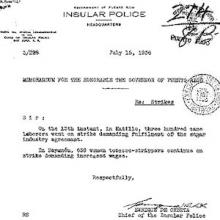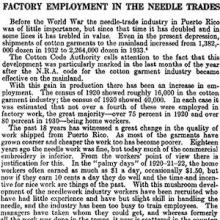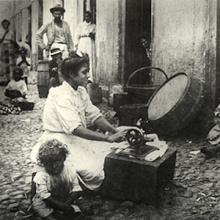Browse Primary Sources
Locate primary sources, including images, objects, media, and texts. Annotations by scholars contextualize sources.
Teleprint, "Summary of the Demands Made by Opposition Groups Represented by the Civic Forum,"
The Czechoslovak Communist Party's attempted to control public opinion in the early days of the Velvet Revolution. The party's strategy for the first week or so consisted of isolating the opposition and using ideological arguments to convince the general public of the harmful consequences of the protesters' demands.
Speech by Premier Ladislav Adamec at an extraordinary session of the CPCz CC, stating his preference for a political solution to the crisis
Only days after November 17 a growing number of Czechoslovak communists were becoming convinced that the conservative leadership's hardliner approach to the growing public unrest was failing.
List of Goals by the Civic Forum
From the beginning, Civic Forum had to balance two objectives: leading popular protests and negotiating with the regime. In its first week, the Forum concentrated on mobilizing public support for the upcoming general strike. November 26 signified a turning point.
The Position of the Civic Forum and Public Against Violence Toward the Negotiations with Czechoslovak Prime Minister Ladislav Adamec
Civic Forum and Public Against Violence released this communique after their second round of negotiations with the government on November 28. The nationwide general strike had occurred the day before with resounding success; it was estimated that between one-half and three-fourths of the adult population participated in some fashion.
Internal Organization of the Civic Forum
Civic Forum suffered from an ongoing identity crisis because the movement's origins conflicted with the demands of leading popular opposition to the state. The dissident intellectuals guiding its early formation had advocated the idea of self-limiting resistance; they didn't want Civic Forum to become a top-down political organization, but rather a free, open society of citizens.
Teleprint, Information on the Conclusions of Nation-wide Party Congress held in Prague
The Czechoslovak Communist Party faced some unpleasant realities on November 28. The previous day's general strike had seriously weakened its hand. That day's negotiations with opposition leader Civic Forum forced it to accept several devastating conditions, including the removal of its constitutionally-guaranteed domination of state and society.
Instructions of the Coordinating Center of the Civic Forum for the Local Forums with a Recommendation for Policy Toward the Communists
The name "Velvet Revolution" was an oxymoron: revolutions were traditionally violent overthrows wiping away the old regime in order to build a new society. The Communist Party followed this model in Eastern Europe, and opposition groups rejected it in 1989 with their strategy of non-violence. But could this strategy successfully remove power from a totalitarian regime?
Letter from Shevardnadze to Gorbachev about the Romanian Crisis
December 1989 proved to be a revolutionary month in Romania. Demonstrations erupted in the city of Timisoara in mid-December, spreading to other parts of Romania within just a few days and developing into a full-scale revolution, which eventually resulted in the execution of President Nicolae Ceausescu and his wife on December 25.
Telephone Call from Chancellor Helmut Kohl of the Federal Republic of Germany to President George H. W. Bush
After the historic and spontaneous dismantling of the Berlin Wall in November 1989, East and West Germany were on the verge of reuniting. Helmut Kohl, the West German chancellor and later chancellor of the reunited Germany, and George H. W.
Telephone Call from President George H. W. Bush to Chancellor Helmut Kohl of Germany
Following World War II, Germany was divided into two countries, with West Germany (Federal Republic of Germany) becoming integrated into Western Europe and East Germany (German Democratic Republic) falling behind the Iron Curtain, with the Soviet Union in control.
Geremek on Solidarity’s Strategy of Restraint in the Spring of 1989
A medieval historian by training, Bronisław Geremek had emerged by the 1980s as one of the Solidarity movement’s leading strategists. At the Round Table talks between Solidarity and the Communist leadership and in the critical months that followed, he was arguably Lech Wałęsa’s most influential advisor.
The Catholic Church's role in the Roundtable Talks
In following letter, a Solidarity activist writes to Józef Cardinal Glemp, the head of the Roman Catholic church in Poland, to inform him of difficulties in setting up much-anticipated Round Table talks with the Communist regime. The correspondence provides some insight into the complicated relationship between Solidarity and the Catholic church.

Official Document, Police Letter
This letter documents the government's continued concern about women striking, as the Chief of Police for the Island reports new labor strike figures to the Governor. In this case, 638 women working as tobacco strippers went on strike. Also on strike were 300 sugarcane workers, most likely men.
Excerpts from Debate Between Lech Walesa and Alfred Miodowicz, 30 November 1988
In the fall of 1988, Alfred Miodowicz, the head of the official union OPZZ (All-Poland Alliance of Trade Unions), challenged Lech Wałesa, the leader of the outlawed Solidarity trade union, to a televised debate. The offer signaled the growing willingness of many party leaders to compromise with opposition groups, but it was also a sign of the party’s continued self-confidence.
Women’s Reflections on Work and Gender Relations under Socialism
In this collection of oral histories from Romania, subjects “R,” “I,” “M,” “E,” and “N” talk about their experiences of work during the socialist period. Although “R” and “M” worked in male-dominated fields and faced harassment by their male colleagues, “M” was able to overcome these difficulties by playing the role of the oddball woman.

Official Document, Women's Employment
The National Recovery Administration (NRA) was a New Deal response to the Depression to stabilize and energize the economy of the United States. One function of the NRA was to set industry standards for products, production methods, and wages. The codes developed for U.S. garment workers were applied to Puerto Rico in July 1933, and by August there were already major strikes.
Women’s Reflections on Marital Relations under Socialism
In this collection of oral histories, “V” and “L” reflect on marital relations under socialism. According to “V,” men’s upbringing in the family played a fundamental role in shaping their attitudes toward wives.

Photograph, Needleworker
This photograph illustrates a home needleworker in the streets of San Juan around 1903. At this time, and afterwards, almost all needlework was done at home. Working at home allowed women to negotiate their own contracts with agents, who commissioned certain types and styles of work. In the best situations, a talented worker could command a salary commensurate with her skill.
Remarks on East-West Relations at the Brandenburg Gate in West Berlin
On June 12, 1987, President Ronald Reagan delivered a major speech on the Cold War with the Brandenburg Gate and the Berlin Wall as a back drop. In staging this speech, President Reagan hoped to draw a parallel with the historic speech delivered in Berlin by President John F. Kennedy in July 1963.
Letter from Muhamet Kapllani to Hans-Dietrich Genscher (Tirana, 18 June 1991)
In this 1991 letter, written in formal diplomatic language, the Foreign Minister of the Republic of Albania agrees to accept a mission to Albania from the Conference on Security and Co-operation in Europe (CSCE) (later the Organization for Security and Cooperation in Europe).